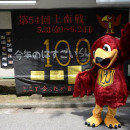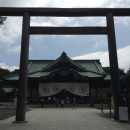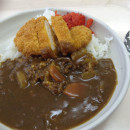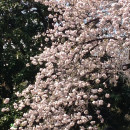Tokyo, an International City with Traditional Flair Past Review
By Britt P (Asian Studies/Civilization., The University of Texas at Austin) - abroad from 09/18/2012 to 07/29/2013 with
Sophia University: Tokyo - Direct Enrollment & Exchange
Not only did I improve my Japanese skills, I explored a good portion of the region and all of the "mini cities" within the giant city of Tokyo itself. I made friends from all over the world, one of whom is a Japanese student from Sophia who has come to UT to study this year. It was extremely worthwhile!!
Review Photos





Personal Information
| How much international exposure did you have prior to this program? | 2 weeks - 1 month |
Review Your Program
|
* Overall educational experience
Academic rigor, intensity, resources, etc. |
Sophia University is located right in the heart of Tokyo. Tokyo is a fantastic city--between the scenic sights, the easy accessibility by train, and tons of things to do, you'll feel like every day is an adventure! I took the intensive Japanese course at Sophia, and be warned, it is VERY intense. If you are allowed by your university to take only one class, it is manageable, but I had to take at least 12 hours and multiple classes along with the intensive course were very difficult to balance. Stay in the Soshigaya International House, the students and staff are very friendly and I felt like it was a second home! |
|
* Host Country Program Administration
On-site administration of your program |
Staff was helpful and courteous and always had paperwork done on time. |
|
* Housing:
How satisfied were you with your living arrangements? |
Soshigaya International House is located a bit further from campus--25 minutes by train from Shinjuku and about a mile walk to the train station--but it is the most welcoming of the dorms. Both native and international students live here so you can practice your Japanese with others. Staff is very friendly and helpful. |
| * Food: |
In Tokyo, there are all kinds of foods from all over the world, and Sophia's menu reflects this. I loved the "katsu curry"! |
|
* Social & Cultural Integration:
How integrated did you feel with the local culture? |
At Sophia, the international atmosphere is present, but Japanese society as a whole is not tailored to be very accepting toward foreigners. Please know this and be mindful of it. |
|
* Health Care:
How well were health issues addressed during the program? |
I got very sick at a bad time of the year. New Years Day I had a high fever, almost high enough where I would have to call an ambulance. For three days, I stayed in bed because the first week of January many public venues are closed, including hospitals. The closest one at the time was further than I could physically travel. When I finally was well enough to go to the hospital, it had just opened and I waited for 3 hours to see a doctor. Seeing the nurse on campus a couple times during the semester was not what I expected, I was referred to other doctors rather than evaluated on site. |
| * Safety: |
Japan is THE safest place I have ever lived or will ever live. Austin is dangerous comparably! |
| If you could do it all over again would you choose the same program? |
Yes
|
Finances
|
* Money: How easily were you able to live on a student's budget?
(1 = not very easy/$200+ on food & personal expenses/week, 2.5 = $100/week, 5 = very easily/minimal cost) |
Tokyo is one of the highest costs of living in the world. It's possible to eat cheaper, but not always healthy. Cooking at the dorm is an option, and Soshigaya House had stovetops and a microwave, as well as a nearby grocery store. Prepare to pay lots of money for entertainment (karaoke, shopping, etc) and train fare. |
| Not including program expenses, about how much money did you spend on food and other expenses each week? | $150 |
| Do you have any general money-saving tips for future study abroad participants? | Budget! Budget! Budget! |
Language
| * Did your program have a foreign language component? | Yes |
|
How much did the program encourage you to use the language?
0 = No encouragement, 5 = frequent encouragement to use the language |
In Japanese 4, English is not allowed to be spoken, you speak only Japanese. |
| How would you rate your language skills at the beginning of the program? | Intermediate |
| How would you rate your language skills at the end of the program? | Advanced |
| What was the highest level language course you had completed prior to departure? | Intermediate Japanese |
| How many hours per day did you use the language? | |
| Do you have any tips/advice on the best ways to practice the language for future study abroad participants? | Meet some Japanese friends, buy books in Japanese and translate them, or watch Japanese TV. |
Other Program Information
|
* Where did you live?
Select all that apply |
|
|
* Who did you live with?
Select all that apply |
|
|
* Who did you take classes with?
Select all that apply |
|
| About how many local friends did you make that you will likely keep in touch with? |
A Look Back
| * What did you like most about the program? |
|
| * What could be improved? |
|
| * What do you know now that you wish you knew before going on this program? | I would have liked to know more about Japanese culture in general. Some things you can only understand by going and experiencing it, but others are more societal "dos and do nots" that should be taught to students interested in Japan. |
Reasons For Studying Abroad
| To help future students find programs attended by like-minded individuals, please choose the profile that most closely represents you. |
The Academic or LinguistYou went abroad with specific academic goals in mind; the program credentials and rigor of your coursework abroad were very important to you. You had a great time abroad, but never lost sight of your studies and (if applicable) were diligent with your foreign language study. Good for you! |








